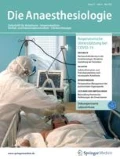Zusammenfassung
Hintergrund
Psychiatrische Notfälle sind eine häufige Indikation für Notarzteinsätze in Deutschland. Bei vielen Notärzten besteht aber Unsicherheit in der Einschätzung der Behandlungsbedürftigkeit von psychiatrischen Notfallpatienten. Es sollte untersucht werden, ob ein selbst entwickelter, einfacher, die psychiatrischen Symptome bewertender Fragebogen (Indikator für psychiatrische Pharmakotherapie, IPP) geeignet ist, Hinweise auf eine Behandlungsbedürftigkeit zu geben.
Material und Methoden
Über einen Zeitraum von einem Jahr wurden prospektiv am Notarztstandort Homburg an der Saar psychiatrische Notfälle im Notarztdienst erfasst. Der IPP-Fragebogen, dessen 7 Kategorien sich an den häufigsten Symptomen psychiatrischer Notfälle orientieren, sollte bei jedem dieser Einsätze ausgefüllt werden. Alle Einsatzprotokolle wurden detailliert ausgewertet.
Ergebnisse
Von den durchgeführten 2114 Einsätzen waren 250 psychiatrische Notfälle (11,8%) mit Intoxikationen, Erregungszuständen und Suizidversuchen als häufigsten Diagnosen. Es konnten 193 IPP-Bogen ausgewertet werden. Von den Patienten erhielten 31,2% eine Medikation aus psychiatrischer Indikation. Diese Patienten mit Medikation erzielten im IPP signifikant mehr Punkte als Patienten, die keine Medikation erhalten hatten (8,0 ± 3,9 vs. 5,6 ± 3,2; p < 0,001). Die IPP-Kategorien „Angst“, „Erregung/Aggressivität“, „Stimmung“ und „körperliche Symptome/Erkrankungen“ hatten den größten Einfluss auf eine Medikamentengabe.
Diskussion
Der IPP kann ein sinnvolles Instrument sein, um psychiatrische Notfallpatienten im Hinblick auf eine notwendige pharmakologische Therapie einzuschätzen. Die Beurteilung von nur 4 Symptomen („Angst“, „Erregung/Aggressivität“, „Stimmung“ und „körperliche Symptome/Erkrankungen“) erscheint ausreichend.
Abstract
Background
Psychiatric emergency situations (PES) are common in the physician-based emergency medical system (EMS) in Germany. However, many emergency physicians (EP) feel insecure in assessing the necessity for treatment of these patients. The aim of this investigation was to evaluate whether a short, newly developed questionnaire (Indicator for Psychiatric Pharmacotherapy, IPP) is able to help EPs in deciding for or against pharmacological treatment.
Patients and methods
The protocols of the EMS at the Saarland University Hospital were prospectively collected over a 1-year period and PESs were identified and analyzed in detail. The 7-item IPP, which focuses on the most relevant psychiatric symptoms, was to be completed for each PES.
Results
Among all calls for an EP (2,114) 250 (11.8%) were classified as a PES. The most frequent diagnoses were alcoholic intoxication, state of agitation and suicide attempts. Of the IPP questionnaires 193 could be evaluated and in 31.2% of all PESs a specific psychiatric medication was administered. These patients scored significantly higher in the IPP compared to those who did not receive medication (8.0 ± 3.9 compared to 5.6 ± 3.2, p < 0.001). The IPP items “anxiety”, “agitation/aggression”, “mood” and “physical symptoms/disorders” had the highest impact on the administration of psychotherapeutic drugs.
Discussion
The IPP can be a valuable tool to assess the necessity of pharmacological treatment for patients in PESs. The assessment of the symptom categories “anxiety”, “agitation/aggression”, “mood” and “physical symptoms/disorders” seems to be sufficient to estimate a need for treatment.

Literatur
Kardels B, Beine KH, Wenning F (2003) Psychiatrische Notfälle in Hamm/Westfalen. Fortschr Neurol Psychiatr 71:129–134
Luiz T (2003) Emergency medicine tomorrow. Anasthesiol Intensivmed Notfallmed Schmerzther 38:296–302
Pajonk FG (2000) Der Umgang mit suizidalen Patienten im Notarzt- und Rettungsdienst. Anasthesiol Intensivmed 41:783–788
Pajonk FG, Bartels HH, Biberthaler P et al (2001) Der psychiatrische Notfall im Rettungsdienst – Häufigkeit, Versorgung und Beurteilung durch Notärzte und Rettungsdienstpersonal. Nervenarzt 72:685–692
Pajonk FG, Bartels HH, Grünberg KAS, Moecke H (2002) Psychiatrische Notfälle – Häufigkeit und Versorgung im Vergleich einer großstädtischen mit einer ländlichen Region. Notfall Rettungsmed 5:110–115
Pajonk FG, Biberthaler P, Cordes O, Moecke HP (1998) Psychiatrische Notfälle aus der Sicht von Notärzten. Anaesthesist 47:588–594
Pajonk F, Cordes O, Bartels HH et al (2000) Krisenintervention bei suizidalen Patienten – Ergebnisse einer Befragung zum Ausbildungsstand von Notärzten. Suizidprophylaxe 27:24–30
Pajonk FG, Gärtner U, Sittinger H et al (2004) Psychiatrische Notfälle aus der Sicht von Rettungsdienstmitarbeitern. Notfall Rettungsmed 7:161–167
Pajonk FG, Grünberg KA, Paschen HR, Moecke H (2001) Psychiatrische Notfälle im Notarztdienst einer deutschen Großstadt. Fortschr Neurol Psychiatr 69:170–174
Pajonk FG, Gruenberg KA, Moecke H, Naber D (2002) Suicides and suicide attempts in emergency medicine. Crisis 23:68–73
Pajonk FG, Lubda H, Sittinger H et al (2004) Psychiatrische Notfälle aus der Sicht von Notärzten – eine Reevaluation nach 7 Jahren. Anaesthesist 53:709–716
Pajonk FG, Riemenschneider O, Moecke H (2001) Evaluation eines Trainingsprogramms „Psychiatrie für Notfallmediziner“. Anasthesiol Intensivmed Notfallmed Schmerzther 36:105–109
Pajonk FG, Schmitt P, Biedler A et al (2008) Psychiatric emergencies in pre-hospital emergency medical systems – a prospective comparison of two urban settings. Gen Hosp Psychiatry 30:360–366
Pajonk FG, Stöwer S, Kinn M, Fleiter B (2006) Psychopharmakotherapie in der Notfallmedizin. Notfall Rettungsmed 9:393–402
Reinhard K, Andrä-Welker M (2005) Small-Area-Analysen im Rettungswesen – Theoretische Überlegungen und praktische Beispiele anhand einer exemplarischen Studie im Saarland. Notfall Rettungsmed 8:182–196
Seiger K, Brommundt J (2002) Krisenintervention im Rettungsdienst – eine Herausforderung an den Notarzt? Notfall Rettungsmed 5:116–118
Interessenkonflikt
Der korrespondierende Autor gibt an, dass kein Interessenkonflikt besteht.
Author information
Authors and Affiliations
Corresponding author
Rights and permissions
About this article
Cite this article
Biedler, A., Helfen, C. & Pajonk, FG. Behandlungsbedürftigkeit psychiatrischer Notfälle im Notarztdienst. Anaesthesist 61, 116–122 (2012). https://doi.org/10.1007/s00101-012-1980-x
Received:
Revised:
Accepted:
Published:
Issue Date:
DOI: https://doi.org/10.1007/s00101-012-1980-x
Schlüsselwörter
- Psychiatrischer Notfall
- Klassifikation
- Pharmakotherapie
- Fragebogen
- Qualitätssicherung, Gesundheitsfürsorge

